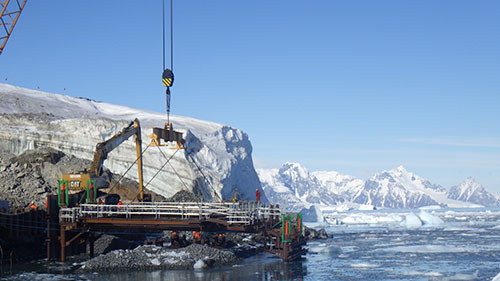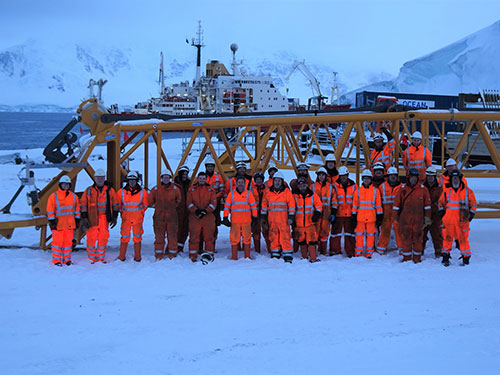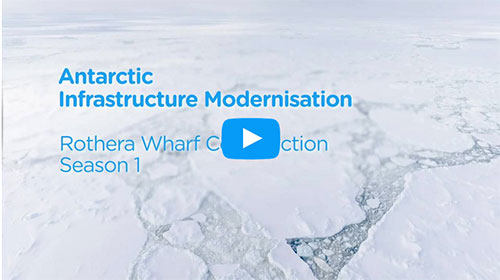Today marks the end of a successful first construction phase of the new wharf at Rothera, the largest British Antarctic Survey (BAS) research centre, ahead of the Antarctic winter. The final construction team members have boarded the RRS James Clark Ross to make their way home following six-months of construction work, which was supported by Technical Advisors, Ramboll.
During the season the team dismantled the existing wharf to make way for the new skeleton structure, with six of the twenty steel frames successfully installed. Towards the end of the season the teams installed steel piles and backfilled with rock to protect the new sections of the wharf from icebergs during the harsh Antarctic winter. All the plant and equipment have now been ‘winterised’ ready for phase two of the construction later this year.
Forming part of a comprehensive programme of works known as the Antarctic Infrastructure Modernisation (AIM), commissioned by the Natural Environment Research Council (NERC) aims to keep the UK at the forefront of climate, biodiversity and ocean research.
The wharf construction team consisted of 50 BAM construction workers led by Construction Leader Martha McGowan. Upon departing Rothera, Martha said “It’s been a remarkable season in many respects- working in a unique and special environment, with an exceptional team, as well as playing a part in helping support the future sustainability of our planet. The entire team that worked here in Rothera and back in the UK can feel proud of what has been achieved, I am truly grateful for all of their support and commitment”.
Once complete, the new 74-metre long wharf will be larger and deeper than the previous one, to accommodate the new polar research vessel, the RRS Sir David Attenborough that will come into operation in 2020. The new wharf will also improve experiences for research and operational personnel working at Rothera. A new crane and enhanced cargo handling facilities will make it easier and quicker to load and unload cargo, whilst enhancing facilities for deploying small boats and gliders used for scientific purposes more efficiently.

David Seaton British Antarctic Survey, Senior Infrastructure Programme Manager, commented, “This last six months has seen some exceptional results and innovative engineering. The teams from BAS, BAM, SWECO and Ramboll completed all that they set out to do. They delivered their work on time and with an excellent safety performance. When construction resumes, we will be starting from a very good point.”
Graham Hopper, BAM’s Project Director said, “The first season of construction works at Rothera Wharf has been a tremendous success. The works have been delivered on programme and to budget, with an excellent safety and environmental performance. This success has been facilitated by the innovative method of delivery that has enabled the early engagement of all partners, the building of relationships and collaborative behaviours, that have mobilised benefits in budget, programme and risk to all partners. Our Employer UKRI/BAS should be given great credit for the selection of the procurement model and mentoring of partners.
“Thanks to these relationships and the early contractor engagement, our teams in Antarctica have worked seamlessly, sharing skills, equipment and delivering solutions to maximise benefit to all. All personnel involved in the project from the construction, scientific and operational communities, deserve to feel very proud of their achievements and I would like to pass on my thanks and admiration to all.”

The next stage
When teams return to work, they’ll work together reviewing results and capturing lessons learnt from season one, to integrate into plans for 2020 and future Antarctic projects. They’ll share learning with industry in the UK and globally, across science and engineering communities and forums. This will include, for example the innovations used to develop materials and components designed to withstand some of the coldest, windiest, remotest parts of our planet, and create sustainable infrastructure.







Leave a Reply
Want to join the discussion?Feel free to contribute!